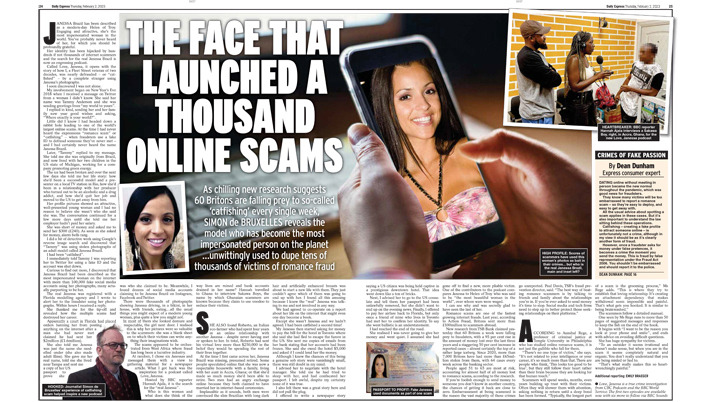
The mainstream media, particularly the press, like to emphasise their superiority over johnny-come-lately “keyboard warriors” on social media. “We invest in journalism,” they say. “We are regulated, we are respected voices, readers can trust us. We speak the truth to power.”
To all of which, sceptics outside the bubble might reply, “Oh yeah?”
But, but, but… We do investigations. We campaign.
Campaign? Certainly. Investigate? Less so. The Times did good work recently on British Gas breaking into people’s homes to install prepayment meters. The Guardian does quite a bit, often in collaboration with other newspapers and agencies around the world. Pooling resources – human, technical and financial – is pretty well the only way newspapers can now hope to do anything like the sort of work they did in the past. Other notable efforts of recent times – such as the Mirror and Partygate – have tended to involve working in tandem with television companies.
For others, “our man investigates” is more likely to mean a guilt-by-association google-and-cuttings character assassination of an ideological opponent than a deep dive into institutional malpractice.
Meaningful investigations these days tend to be undertaken outside of the mainstream – by the likes of Tortoise and Byline Times and Private Eye, or by independent podcast companies. The Good Law Project has done more on pandemic procurement than any traditional media outlet. It’s not just investigations, either. These are the places that people are beginning to look to when they want original journalism, something beyond the establishment agenda. But they’re still a long way from breaking through to become the new “mainstream” – or even part of it.
Status quo
This is because the information machinery militates against them. The press, politicians, palace and police have built up a symbiotic relationship over more than a century. They all pretend to be operating independently and “without fear or favour”, but the relationships seem to have got cosier rather than the reverse in recent years. No wonder Leveson 2 was scrapped; it suits all the existing players for the status quo to persist. Meanwhile, broadcasters amplify their messages with their press reviews – bringing newspaper headlines to the attention of millions of people who wouldn’t dream of buying the product – and by following their news agendas.
The result is an ever-narrowing of subject matter and an ever-widening gulf between the informed and the ignorant. Sadly, the informed tend to be those who get their news from a wider variety of sources, while the ignorant (by which I mean the opposite of informed, rather than in any judgmental way) still rely on newspapers and two-minute radio news bulletins. Sadly, that is, for our trade – in that we are not meeting the needs of the majority – and for society because it means valid voices are not being heard, issues are not being addressed.
Not asking the right questions
Consider how many column inches have been devoted to what Boris says or what Kate is wearing and then consider how few have looked at the actual people using food banks (as opposed to photo-opportunity politicians and royals visiting them), at how many libraries have shut, at how many bus services have been cut, at how and why people with what were once manageable disabilities are finding their lives more difficult. Whole sections of society are disregarded, whole areas of policy undiscussed.
Who asked for voter ID when there is minimal electoral fraud? Who benefits, who loses? How much have we read about it in the Telegraph, Sun, Mail, Express? We may have become impatient with the likes of Extinction Rebellion or Just Stop Oil or even Steve Bray; we may get fed up with trains not running on time or worried about delayed hospital appointments, but did we vote for on-the-hoof laws curbing our rights to protest or strike? All sorts of freedoms have been stripped away since the Brexit referendum and this is presented by most of our newspapers as a good thing rather than a concern. It’s as though freedoms are for “people like us”, not the poor, the young, the LGBT+, and definitely not the woke, asylum-seekers, or people from other countries or ethnic backgrounds – even if they’ve been living here for years or all their lives.
Is it any wonder that newspaper readerships are shrinking faster than one of Sunak’s cashmere jumpers on a boil wash? With so many people now cast as “the other” and excluded from editorial consideration, since they will never part with a quid to buy a paper, our “popular” – or rather “populist” – papers retreat to what they think matters to their core audiences: pensions and care home costs for the Express, footballers and reality TV stars for the Sun. A medium that was once a source of information, entertainment and even delight has become a vehicle for hate and resentment; even the “fun” tends to be rooted in cruelty. It’s like a vortex sucking the guts and soul out of real journalism.
Good journalism is all about telling people things they might not want to hear, but which they need to know. About setting events in context and giving the full picture, not just a token “balancing” quote. About speaking up for those who cannot speak for themselves, not turning up the amplifier for the man with the mic in his hand.
Agenda-driven
If the old media are right about one thing, it is that “professional” journalists are absolutely the best people to do this; people who have been trained to ask the right questions. They are right that newspapers should be more reliable sources of information than Instagram. They are right that they “curate” material, are in a position to challenge assertions, to sift the facts from the fantasy.
The trouble is, that isn’t always what they do. Material published in newspapers – of the right and the left – is just as liable to be slanted as any unfiltered Twitter thread from someone with an axe to grind.
The old media can – and do – argue that the tech giants are driven by profit, are lawless and unregulated, irresponsible and unaccountable; that it is commercially unfair that the BBC – particularly its news output – should be financed by the taxpayer; that it is wrong for the legal profession to collude with Russian oligarchs and sex abusers in using threats and non-disclosure agreements to stifle legitimate public-interest journalistic inquiry. They should all be reined in.
But traditional publishers aren’t charities; they, too, are businesses out to make a profit. The newspapers themselves may not make money – 60 million people in this country don’t buy one – but their front pages, shared by broadcasters and on social media and on display in supermarkets, railway stations and garages, have influence where it matters: in Westminster, where the laws that determine their trading environment are made.
Regulated, really?
They sign up to an “independent” standards watchdog, but Ipso isn’t a regulator in the way that Ofgem or Ofwat or Ofsted are. It can’t – or won’t – instigate investigations or publish reports off its own bat. It waits for people to complain and then reacts. It has – as newspapers repeatedly say when claiming (wrongly) that ours is the “toughest regulatory regime in the world” – the power to issue fines of up to £1m, but it has yet to demand as much as a fiver from anyone found at fault.
And, yes, our laws may make it too easy for the super-rich to avoid scrutiny, as Geoffrey Robertson asserts in his recent book ‘Lawfare’, but the use of NDAs is not restricted to wealthy sexual predators. Why else do we not know chapter and verse on all those hacking offences for which News UK and the Mirror have paid out hundreds of millions in compensation?
These arguments – many of which are fully justified – are presented in the name of a free press and democracy, but they come from a position of weakness and fear. For while it’s true that there are plenty of nutters and conspiracy theorists on social media, there are also experts in all fields who are not only willing to share their knowledge, but eager to do so to get it out there unspun. Politicians, too, have realised that they can reach out to the electorate directly, without the need for press releases and press conferences – though obviously a friendly lobby journalist willing to take dictation is always welcome.
Unoriginal content
Meanwhile, newspapers – or their digital counterparts – shamelessly mine those hated rivals for copy. On one page, there is fury at the BBC’s latest profligacy or bias, on the next, there’s a feature about Happy Valley or Strictly. Reporters no longer have to phone people up to get their opinions, all they have to do is look at their socials and quote from the posts on their timelines. If they want to stir controversy, a quick search of a hashtag should provide half a dozen “outraged” people.
Then there is the plagiarism, some of it quite shameless. In February, the Daily Express carried a spread about a woman whose persona had been used for thousands of romance scams, known as catfishing. It was a bloody good story that had involved a lot of work across three continents by former Times man Simon de Bruxelles and the BBC reporter Hannah Ajala. They worked together to produce a six-part true-crime podcast, “Love, Janessa”, after de Bruxelles was caught in the scam himself. To promote the series, he wrote about his experience for the Express. Within hours, the story had appeared on the Mail, Mirror and Star websites. All had similar headlines, all had other people’s bylines and all lifted great chunks from the Express article in inverted commas as though they had interviewed de Bruxelles themselves.
This is far from unusual. But it caused de Bruxelles to ponder the question I posed at the top of this article: who counts as a journalist? He felt his work had been used unfairly and submitted invoices (as yet unacknowledged and unpaid) to the relevant newsdesks. He accepted that he couldn’t claim ownership of a news story, no matter how exclusive, but said: “I feel that in the case of a first-person piece, they shouldn’t be able simply to lift it, put quote marks round my words and then republish as their own work.
“Once my words have been published, are they fair game for anyone who wants to recycle them? What about all those stories based on Twitter comments that papers seem to love? Do their words deserve credit? What is the distinction between a professional journalist, a salaried columnist, a freelance contributor, a content creator for a free website such as Reddit and all the variations in between?”
What indeed? We’re back to that question of original reporting. Newspapers boast about “investing in journalism”, but it’s cheaper to plunder print, broadcast and online competitors.
How it should be
If old media’s USP is that it offers curated material based on journalistic rigour and editorial judgment, that’s what it needs to provide. Not propaganda for vested interests, be they business or political, and regurgitated titbits from rival organisations.
Trust in what used to be called Fleet Street is evaporating, and the newspaper industry may appear to be in terminal decline. But there is still an appetite for good journalism in print form; news periodicals’ circulations are healthy. The press barons could, if they wished, truly invest in their journalism, but they see their websites – run on a shoestring with almost no original content – as the real income stream. It feels as though the print titles are kept alive for two reasons: the branding that lends respectability to the clickbait online, and the influence they can exert in the corridors of power.
As we approach the next election, we will see a lot of ugly “journalism”, not least because not only the future of the press, but its very existence in its current form, may well be determined by the result. The cost of living and the continuing ramifications of Brexit and the pandemic will dominate the early part of the next administration, but if Labour comes to power, we can expect the whole question of media ownership and regulation to come to the fore. And if the Conservatives stay in office, life will become very much more uncomfortable for the BBC and the social media platforms.
Whatever happens, there will still be real journalists out there wanting to tell the story straight, wanting to explain what a policy or event means, wanting to right wrongs, and wanting to give voice to the unheard. We may just have to look a little further afield to find their work.
This article was first published in InPublishing magazine. If you would like to be added to the free mailing list to receive the magazine, please register here.












